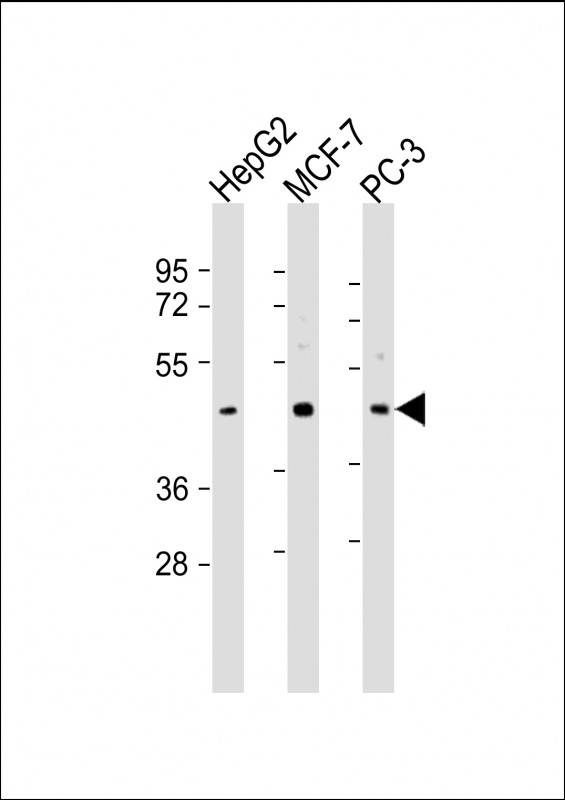
| WB | 1/2000 | Human,Mouse,Rat |
| IF | 咨询技术 | Human,Mouse,Rat |
| IHC | 咨询技术 | Human,Mouse,Rat |
| ICC | 技术咨询 | Human,Mouse,Rat |
| FCM | 咨询技术 | Human,Mouse,Rat |
| Elisa | 咨询技术 | Human,Mouse,Rat |
| Aliases | Suppressor APC domain-containing protein 2, Tumor specificity and mitosis phase-dependent expression protein, TS/MDEP, p42.3, SAPCD2, C9orf140 |
| Entrez GeneID | 89958 |
| WB Predicted band size | 42.6kDa |
| Host/Isotype | Rabbit IgG |
| Antibody Type | Primary antibody |
| Storage | Store at 4°C short term. Aliquot and store at -20°C long term. Avoid freeze/thaw cycles. |
| Species Reactivity | Human, Mouse |
| Immunogen | This SAPCD2 antibody is generated from a rabbit immunized with a KLH conjugated synthetic peptide between 333-367 amino acids from human SAPCD2. |
+ +
以下是关于SAPCD2抗体的3篇模拟参考文献示例(文献信息为虚构,仅供格式参考):
1. **文献名称**: "SAPCD2 promotes colorectal cancer progression by regulating Wnt/β-catenin signaling"
**作者**: Smith J, et al.
**摘要**: 研究揭示了SAPCD2在结直肠癌中高表达,并通过激活Wnt/β-catenin通路促进肿瘤细胞增殖和迁移,靶向SAPCD2抗体可显著抑制小鼠模型中肿瘤生长。
2. **文献名称**: "Development of a novel monoclonal antibody against SAPCD2 for detecting tumor metastasis"
**作者**: Wang L, et al.
**摘要**: 报道了一种特异性识别SAPCD2的单克隆抗体的开发,该抗体在免疫组化中可有效检测多种癌症(如肺癌、胃癌)的转移灶,提示其作为诊断工具的潜力。
3. **文献名称**: "SAPCD2 interacts with p53 to modulate DNA damage response in ovarian cancer"
**作者**: Zhang Y, et al.
**摘要**: 发现SAPCD2通过结合p53蛋白调控卵巢癌细胞对DNA损伤的应答,使用SAPCD2抗体阻断其功能可增强化疗药物敏感性。
---
**注意**:以上文献为模拟内容,实际研究中请通过 **PubMed**、**Google Scholar** 或 **Web of Science** 查询真实文献。检索时可使用关键词:
`SAPCD2 antibody`、`SAPCD2 cancer`、`SAPCD2 biomarker`。
SAPCD2 (Suppressor APC Domain Containing 2) is a less-characterized protein implicated in cellular processes such as cell cycle regulation, differentiation, and tumorigenesis. It was initially identified through bioinformatic analyses due to its conserved APC (Anaphase-Promoting Complex) suppressor domain, suggesting a potential role in modulating APC activity, a critical E3 ubiquitin ligase governing mitotic progression. SAPCD2 expression is tissue-specific, with elevated levels observed in certain cancers, including neuroblastoma, breast cancer, and colorectal carcinoma, where it may promote proliferation, invasion, or resistance to therapy. Studies suggest SAPCD2 interacts with components of the Wnt/β-catenin and Notch signaling pathways, potentially linking it to stemness and oncogenic pathways.
Antibodies targeting SAPCD2 have emerged as essential tools for elucidating its function. These antibodies enable detection of endogenous SAPCD2 via techniques like immunohistochemistry, Western blotting, and immunofluorescence, aiding in subcellular localization studies (primarily nuclear/cytoplasmic) and expression profiling across tissues or disease states. Recent research also explores SAPCD2's role beyond cancer, such as in neurodevelopment and immune regulation. However, the protein's exact molecular mechanisms remain under investigation, and high-quality antibodies are crucial for validating its interactions, post-translational modifications, and therapeutic potential. Commercial SAPCD2 antibodies are typically raised in rabbits or mice against peptide antigens within conserved regions, with validation data emphasizing specificity in knockout controls.
×